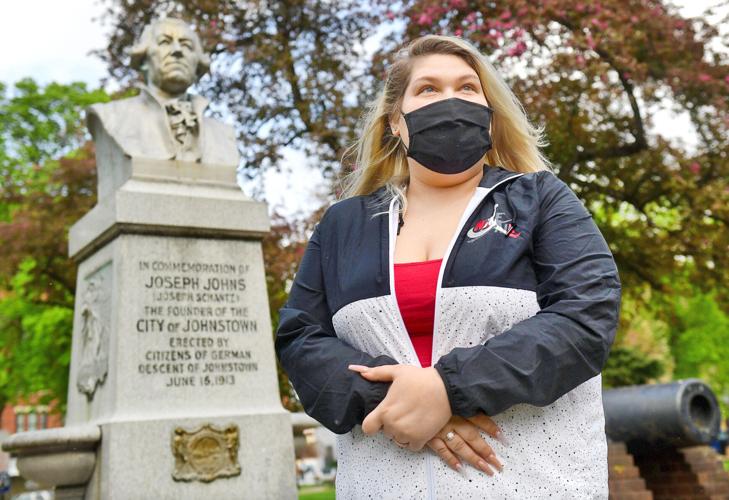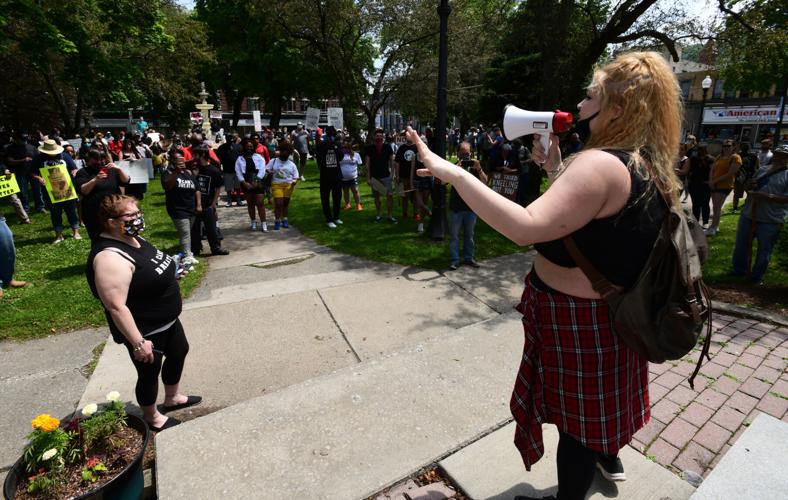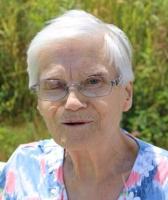Kirsten Vazquez stood a few feet away from the Joseph Johns statue, a tribute to Johnstown’s founder, and yelled into a megaphone, calling out for criminal justice reform, unity and an end to racism in her hometown.
About 500 supporters joined her during the “Justice 4 George” rally that took place last June in Central Park. They gathered in support of George Floyd, an unarmed Black man, who died when Derek Chauvin, a white Minneapolis police officer, knelt on his neck for several minutes.
Kirsten Vazquez reflects upon the “Justice 4 George” rally held in Johnstown in 2020.
Vazquez returned to the park in April, the day after Chauvin was found guilty of second-degree murder, third-degree murder and second-degree manslaughter.
There was no crowd. No march from Central Park, to the Route 56 and Napoleon Street intersection, to the Public Safety Building, back to the town square. No “Black Lives Matter” chants. No megaphone.
Instead, Vazquez – who, as part of Allies for Justice, organized the march – quietly reflected on the past year: the murder, the rally, the riots in other cities, race relations and the verdict.
“I’m really proud of how our town came together,” Vazquez said. “Talking before the rally, tensions were really high. But I couldn’t have hoped for it to have turned out any better than it did. Protests like this popped up all over the world. Different countries were even coming together for George Floyd. I’m just proud to say that our town was able to come together in such a way that I feel like it really did make a difference. So much good came of it.”
Vazquez is now preparing to participate in another rally.
On Tuesday, the one-year anniversary of Floyd’s murder, she plans to be in Harrisburg for the Rally for Reframing Justice, sponsored by the We Can’t Wait Pennsylvania Statewide Coalition and Pennsylvania Youth Against Injustice.
“I just want to keep fighting, keep finding ways to fight injustice, really finding a way to get the true equality that we’re supposed to have in this country,” Vazquez said.
The event, which We Can’t Wait founder Carmina Taylor described as a “celebration,” will include Pennsylvania Legislative Black Caucus members and young adults, such as Vazquez, 23, from across the commonwealth.
“We’re trying to include Johnstown, and the community and the young people of Johnstown, to be part of a bigger picture,” Taylor said. “We want them to develop connections to other students across the state. We want them to make relationships. “We’re inviting them to speak their voice, share their stories. and then we all will collectively engage in a plan to help our respective communities.”
Time of unrest
Demonstrations had taken place in many major cities and small towns by the time Johnstown held its event on June 6. Riots, too, had occurred in places such as Minneapolis, Philadelphia, Washington, D.C., New York and Los Angeles, creating a sense of tension.
On the day of the Johnstown rally, businesses in Richland Town Center, located about six miles away from Central Park, closed – with a few even boarding windows. At the time, Richland Township Police Department Chief Michael Burgan said he thought “they were just acting out of an abundance of caution” and that “a lot of that was made at the level of their corporate offices – who decided to close.”
No credible reports of planned violence were discovered by the Richland police.
Three stores in the complex, Petco, Walmart and Michaels, were contacted in recent weeks to discuss their reactions. All three local franchises deferred to corporate headquarters. None of the corporate press offices accepted an invitation for an interview.
In downtown, an individual with a gun sat outside Scott’s By Dam, a popular bar, as protesters marched along Market Street.
“I’d rather just leave that all die,” said Scott McLachlan, owner of Scott’s By Dam. “It was just something that happened. I would just rather leave that alone. He was just there to protect my place. That was all I have to say about that. I want people to be able to rally and do whatever they want to do. That was to protect my place and only that. Nothing against the rally people, nothing.”
McLachlan continued: “He’s a vet of five tours. I just know him, and he asked me, and I said, ‘Sure.’ I had myself carrying, too. It had nothing to do with the rally whatsoever. It was the aftermath of what we saw on the news, what they did.
“I was protecting my investment and my life. Nothing to do with them. I want people to be able to protest and do whatever they want to do. That’s what makes us America. It had nothing to do with the protesters.”
He said Scott’s is “a family-run business and we accept everybody and anybody that walks into this establishment” and that “if somebody judged me the wrong way, they don’t really know who I am, then.”
Vazquez felt the reaction “was a little bit unfair.”
Calvin Berkins, owner of Shear Magic barber shop, talks about George Floyd and policing in Johnstown during an interview on Wednesday, April 28.
Calvin Berkins, owner of Shear Magic barbershop on Market Street, thought displaying a gun “wasn’t necessary, because it was all peaceful.”
“A lot of businesses was closing up,” Berkins said. “Remember that? Everybody wanted to close up, and I’m looking like, ‘Wait a minute, what do you mean, close up? I’m not closing.’ All those people walked by here. I think I got a lot of business because they were all smiling, ‘Yo, Cal, what’s up?’ I think it was something special to watch, something really special to watch.”
A rural shooting
Soon afterward, in August, about 20 Black Lives Matter activists made a 745-mile march from Milwaukee, Wisconsin, to Washington, D.C., where they planned to mark the anniversary of the Rev. Martin Luther King Jr.’s “I Have a Dream Speech.”
The group passed through Bedford County where, on Aug. 24, they stopped alongside rural Route 30 near a towing garage and home owned by John Myers. His son, Terry Myers, arrived and fired a 12-gauge shotgun into the air, then saw two flashes and then allegedly fired at the crowd, hitting one of the marchers, Orsino V. Thurman, 37, of Milwaukee, according to an affidavit.
Terry Myers, 51, of Schellsburg, was recently charged with aggravated assault with a deadly weapon, a second-degree felony, and 19 counts each of recklessly endangering another person and simple assault. Thurman, a convicted felon who allegedly returned fire, has been charged with aggravated assault, reckless endangerment and illegal possession of a firearm.
Bedford County District Attorney Lesley Childers-Potts filed the charges on May 7, just days after Spotlight PA and The Tribune-Democrat learned she had been given the results of a Pennsylvania State Police investigation in early March, but had not yet taken action.
‘Tired of conversations’
The protests are done.
Rioting has ceased.
Chauvin was found guilty in a moment that Ross Kleinstuber, a University of Pittsburgh at Johnstown associate professor of criminology, described as “kind of watershed-y” because “it might maybe spark reform” and raise “increased awareness of some of the problems.”
Volunteers, led by Deacon Jeffrey Wilson, of Pleasant Hill Baptist Church, and Johns-town City Councilman Ricky Britt, painted “End Racism Now” in bright yellow letters on Main Street last summer. New Johnstown Police Department Chief Richard Pritchard and the Johnstown Police Advisory Board are working together.
Leaders of the Black community, elected officials and law enforcement officers generally describe local race relations as better than years ago, when local traffic stops disproportionately involved Black motorists and a few cops were a “terror in our communities,” in Wilson’s opinion.
But there are currently no people of color on the Johnstown police force.
Some activists are upset that the identities of the JPD officers who shot and killed Elip Cheatham, a 27-year-old Black man who drove a vehicle toward cops at a speed of 60 mph during an incident in 2012, have never been publicly identified.
And racial tension, stemming from the Floyd murder and other incidents, still exists in the nation. Calls have been made to defund police departments.
So where do things go from here? Because, as Brandon King, elder at Christ Centered Community Church, said, “fires” are still burning.
“And, when I say ‘fires,’ I mean there are still the issues between police and the urban community that needs to be addressed,” King said. “We have to stop sitting at the table, talking about it. There has to be something now that we’re past talking. We have to do because it seems this issue between the police and the urban community is a revolving door.
“Black unarmed man gets shot by a police officer. There’s outcry. There’s everything else. Then there’s a jury. Then that cop’s probably found not guilty or whatever, and then there’s rioting, there’s looting, there’s this and there’s that.”
Wilson, the advisory board’s president, expressed similar feelings, saying, “I don’t like the word that you always hear all the time about, ‘Let’s have a conversation on race.’ People are tired of conversations. We’ve been having conversations for 400 years plus. What has to happen is concrete action.”
He points to the importance of education.
“It starts by teaching the true history of America,” Wilson said. “Until citizens understand all the contributions that all people made to this country, we’re always going to have a problem because we don’t respect each other and understand what each one of us brings good and bad, what the positive and the negatives are, how we got from there to here. Until America teaches the true history on a broad level in all of our school districts, private, public and in between, we’re going to continue to have a problem.”
Calvin Berkins, owner of Shear Magic barber shop, talks about George Floyd's murder and policing in Johnstown during an interview on Wednesday, April 28.
Berkins believes banks need to offer more support to minority-owned businesses, which can create jobs and help address the issues of poverty and crime.
“People talk about George Floyd and changes that are going through our nation,” Berkins said. “The real change, I think, starts with our financial institutions. This is why, if the financial institutions don’t unload some of the money to some of the folks that apply for it, everything is going to stay the same.”
And for King, God is the answer.
“I think besides prayer, there needs to be a common objective where we come together and say to ourselves that it’s up to us to solve this problem. … If we go back to what the Bible says and do what is right according to the word of God, I guarantee you you’ll see some change,” King said. “But it can’t happen unless we go back to the word of God, and we have to do that.”


































Commented
Sorry, there are no recent results for popular commented articles.